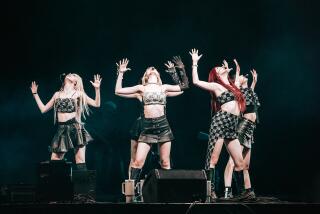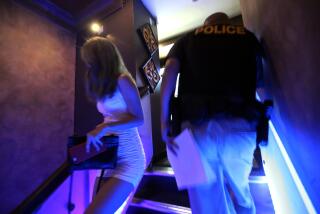Chinese reality show ‘The Rap of China’ comes to L.A. to seek its next star

L.A. Times Today airs Monday through Friday at 7 p.m. and 10 p.m on Spectrum News 1.
Xingyu Li was excited. The 20-year-old chemistry student traveled 120 miles from San Diego to downtown Los Angeles where he was about to do something he hadn’t done before: rap on the helipad of a skyscraper.
Wearing glasses, a backpack and an oversize red sweatshirt, Li took to the stage decorated with black barrels emblazoned in gold with the word “R!CH.” He awkwardly grabbed the mic from another contestant before launching into his 50-second patter in Chinese:
Success will come sooner or later
Music is my baby…
While I’m still young and ambitious
I’ll chase my dream no matter what
I work this hard, just to draw your attention.
Li was among 50 people who had been invited to try out for the next season of “The Rap of China,” one of the country’s most popular reality TV shows.
“In the U.S., it’s way harder. There are a lot of people who are trying to become a famous rap star,” said Li, a UC San Diego student who grew up in Guangzhou. “You still have a lot of room to become one of the greatest in Chinese.”

Hip-hop has risen in mainstream culture in China over the last two years. That’s in part due to the iQIYI reality show “The Rap of China,” which reached 100 million views within its first four hours of airing.
When “The Rap of China” launched in 2017, it pushed rap music that was largely underground into the mainstream. Now producers are turning to L.A. and other cities to find fresh talent at a time when the program appears to be losing some cachet at home. Following the global success of K-pop in South Korea, they are hoping to build an international audience for the show, which caters to Mandarin speakers and is available with a subscription to Chinese streaming platform iQIYI.
“Over here, you are closer to hip-hop culture, so you are discovering something that is a little more pioneering,” Chen Wei, executive producer of “The Rap of China,” said in Mandarin through a translator. “We really love to bring hip-hop rappers from here to China to have the talents communicate [and] collaborate with each other. Hopefully that will bring a newer energy.”
The show, which is filming its third season, is expanding its search to Toronto and Seoul. It will continue to have auditions in Australia and Malaysia, as well as Southern California.
“The advantage is just to access global talent, especially when you think about something like rap and hip-hop that is so much more mainstream and has a longer legacy in North America than it does in China,” said Connie Chan, a general partner at Menlo Park venture capital firm Andreessen Horowitz. “The likelihood that you are going to chance upon great talent in L.A. is pretty high, actually.”
The global push comes as “The Rap of China” has faced growing controversies and criticism from fans at home, where contestants have been increasingly fearful of offending government censors, analysts say.
“The last season of ‘The Rap of China’ did not do well because many people thought the Chinese rappers were appearing soft and not authentic,” said L.A.-based venture capitalist Michael Y. Chow, who invests in the media, tech and entertainment space.
The raps at the L.A. audition were decidedly milder and more apolitical than their U.S. counterparts — there was no critique of the police or the criminal justice system, or of government oppression. Instead, the raps were about topics censors would probably green-light — the challenges of finding friends as an international student or working on their music at home while others partied at nightclubs. One rapper even complained about his mortgage.
Chen said the topics some rappers focus on in the U.S. aren’t an issue in China. On his show, contestants are discouraged from talking about anything sexual or vulgar, which would run afoul of China’s strict government censorship rules. That oversight has restricted not just rap music but also movies, apps and social media in the world’s most populous country.
The mainstream rap artists in China “don’t dare express their anger,” said Xiaoqiang Shushu, a Chengdu-based music commentator. “There are invisible big hands pressing on them.”
“The Rap of China” skyrocketed to popularity in its first season, drawing 1.3 billion views in a little over a month. Rappers who were featured on the show went on to land record deals. Chinese youth began adopting the show’s street fashion sense.
“This show really catapulted that whole genre of music to go completely mainstream,” said Chan, with Andreessen Horowitz.
“The Rap of China” provided a large platform for rap artists to showcase their work; but in return, artists have been careful about what they talk about in their lyrics.
After the first season, former contestant PG One apologized for lewd lyrics, and rapper Gai, who competed on “The Rap of China,” was later pulled off from a different show.
In the second season, rappers took pains to avoid offending censors.
The show even changed its Chinese name in Season 2, from “China Has Hip-Hop” to “China’s New Rap,” because hip-hop has become a sensitive topic in China, Shushu noted.
Producers haven’t disclosed viewership figures for the last season.
Chen declined to discuss the government’s role in the program but said rap, like any art form, develops over time.
U.S. rap artists have had their own conflicts with authorities. In the late 1980s, the FBI sent a disapproving letter to the music distributor for Compton rap group N.W.A for the song “F— tha Police,” which addresses racial profiling. N.W.A was seen as influential in using music to protest and shine a light on what was happening in African American communities.
“From Brooklyn all the way here in Compton it didn’t start perfect; it had some controversy, but it also developed from the ground,” Chen said.
He acknowledged that he’s looking for more friendly material that would be suitable for kids to watch, an approach that has drawn scorn from underground rappers back in China.
On a Saturday night in one of Beijing’s hutong alleyways, rappers and fans in dreadlocks, chain necklaces, big shirts and baggy pants crowded into a bar inside an old storage building.
Neon lights flashed across the stage, moving from its Chinese painting backdrop to a mural of gnomes and glowing mushrooms on the wall. The bar owner improvised on the drums.
L-Force, a Uighur minority rapper, was hosting the night’s event: an elimination-style rap battle among 30 rappers.
Even among underground rappers, Chinese rap is more personal, less political than in the U.S., said L-Force, who declined to give his real name for security reasons.
“Nobody wants to scream, ‘[expletive] the police,’” he said. “Also, it’s not really about the police here.”
But there’s a clear divide between underground and “wannabe mainstream” rappers, he said.
“The underground rappers don’t give a [expletive] about what the TV is saying or what mainstream is talking about,” L-Force said.
At the rap battle, the difference between underground freestyle and the “positive energy” rap on TV shows like “The Rap of China” was immediately obvious. Many of the underground teenage rappers were much more profane, swearing and insulting one another’s mothers and genitalia.
Qin Jianchi, who goes by the stage name “Dog Chain,” won that night’s rap battle but said he would never go on “The Rap of China.”
Rappers in the public sphere can’t be honest and are censoring themselves to get famous, said Qin, 16.
“I would rather be an underground rapper for life than getting on a show like that,” he said.
Chow, the venture capitalist, doesn’t think there will be demand for censored Chinese rap globally, adding that hip-hop will remain a subculture in China because of restrictions on free expression.
“Authenticity is critical, and when censorship limits or prohibits complete free expression then it’s deemed not genuine,” he said.
But Li, the UC San Diego student at the L.A. auditions, said he accepts the content limitations.
“If you want to be in this show, you have to obey the rules,” said Li, who goes by the stage name “Michelen 米其林.”
He made it to the last round of the audition but ultimately did not make the final cut. Still, Li says he’s determined to keep at it, to the chagrin of his mother.
“She wants me to have a regular job and wants me to have food on the table,” Li said.
Lee reported from Los Angeles and Su from Beijing. Researcher Gaochao Zhang contributed to this report.
More to Read
The biggest entertainment stories
Get our big stories about Hollywood, film, television, music, arts, culture and more right in your inbox as soon as they publish.
You may occasionally receive promotional content from the Los Angeles Times.








